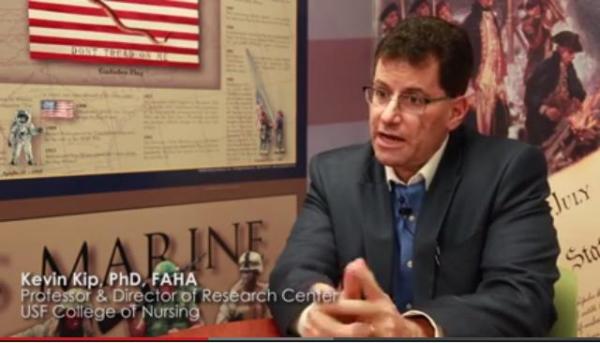PTSD的新疗法Accelerated Resolution Therapy (ART)
Soldiers and other service members whose mental health is negatively affected by conflict could see their symptoms improved through the use of Accelerated Resolution Therapy (ART), a new study has concluded. The research was carried out at the University of South Florida College of Nursing and involved 57 service members and veterans.
ART is carried out in two stages.
ART分两个阶段进行
In the first, the patient visualises a traumatic experience that brings on
symptoms of post-traumatic stress disorder (PTSD), while their psychologist
initiates talking therapy and also gets the patient to follow their hand as it
moves left to right.
第一步患者在脑中使想像一个创伤经历以便产生PTSD症状,当心理学家开始会谈并让患者跟随他左右移动的手(指)。
In the second, the patient is trained to replace the distressing images with positive ones so the former are no longer accessible by the mind.
第二步,患者被训练用积极的画面替代创伤画面,致使创伤画面不再被意识到。
It was found that this combination of evidence-based psychotherapies and use of eye movements was effective but also more likely to be completed than conventional therapies.
Writing in the journal Military Medicine lead study author Professor Kevin Kip said: "Our goal is to obtain enough evidence and interest to warrant classifying ART as a potential first-line treatment for PTSD among both civilian and military personnel."
However, the British Chartered Psychologist Dr Derek Indoe expressed caution about the advocacy of this new therapy:
“The evidence base in EMDR for addressing single trauma events is already good, but can be improved. EMDR consists of two parts as well - the desensitisation of the traumatic event and the installation of the positive image. EMDR also addresses negative thinking and can be said to share imaginable exposure and approximation to the feared event/ image. EMDR does not require the patient to talk but does require a solid therapeutic alliance.
“So what is new about ART that it has not borrowed from EMDR? We need more rigour in the research that shows why EMDR works, not borrowed pieces of EMDR that stand on weaker evidence.”
Find out about becoming a member of the British Psychological Society.
If you are not eligible for full membership of the Society, you can become a subscriber.
Want to comment on this news story? Then sign in to our website to submit a comment. All comments are submitted for moderation.





发表评论 评论 (1 个评论)
The findings appear online in advance of December's print issue of Military Medicine, the international journal of AMSUS.
Kevin Kip, PhD, FAHA, professor and executive director for the Research Center at the USF College of Nursing, led the team of scientists and clinicians who conducted the first randomized controlled trial of ART in a military population. The trial enrolled 57 service members and veterans, primarily from the Tampa Bay area.
"Based on this trial and an earlier study completed at the USF College of Nursing, we believe that accelerated resolution therapy may provide the quickest way to effectively and safely treat post-traumatic stress disorder," Dr. Kip said. "Our goal is to obtain enough evidence and interest to warrant classifying ART as a potential first-line treatment for PTSD among both civilian and military personnel."
"Dr. Kip's work on this project has been phenomenal," said Dianne Morrison-Beedy, PhD, RN, WHNP-BC, FNAP, FAANP, FAAN, senior associate vice president of USF Health, and dean of the College of Nursing. "ART has been a cornerstone of RESTORE LIVES at USF Nursing as we continue developing research and education to advance the health care received by veterans, service members and their families."
ART works in two phases to alleviate psychological trauma symptoms and related disorders such as depression and anxiety.
The patient first visualizes in his or her mind a prior traumatic experience which typically elicits uncomfortable physiological sensations like tightness of the chest, increased heart rate and sweating. Then, through talk therapy and a series of rapid left-to-right eye movements in which the patient follows the clinician's hand back and forth, the sensations are minimized. In the second phase, and with similar clinician input, the patient "replaces" the distressing images they have seen with positive ones in a way that the original distressing images can no longer be accessed. ART is delivered in two to five one-hour sessions, requires no homework, and no written or verbal recall of the traumatic experience.
"Through this therapy, we're able to quiet down and separate physiological symptoms that come with re-envisioning a traumatic experience," Dr. Kip said. "We can also alter or replace the traumatic images and add positive material to them. We are changing how images are remembered in the brain."
It worked well for Brian Anderson, a former Green Beret, 10-year Army veteran and director of the Pasco County Veteran Services and Stand Down program. He had tried an endorsed first-line PTSD treatment known as prolonged exposure therapy, which was very lengthy and worked for a while, but then symptoms like hyper-vigilance returned.
"ART changed my life," Anderson said. "This brief therapy took the bad memories that constantly resurfaced and put them in the proper order or long-term storage; it was almost like I was thinking about a time in history. As a veteran, I would much rather go through a therapy that works, in only a few sessions, than sit through intensive and grueling sessions that last as long as 16 weeks."
In this study, researchers compared ART to a non-therapeutic PTSD treatment called attention control (AC) regimen. Clinicians treated half of the 57 study participants (29) with ART, and the other half (28) received AC, which consisted of either physical fitness assessment and planning or career assessment and planning. After initial treatment, both groups received a three-month follow-up assessment.
"Before and after these interventions, we compared the response analyzing reductions in PTSD symptoms, depression and anxiety, and the results were very impressive," Dr. Kip said. "In an average of less than four ART sessions, participants had very substantially reduced symptoms of PTSD, while those who received AC did not."
After the AC regimen, all veterans had the opportunity to receive ART, and in the full study, 94 percent completed treatment. Favorable results persisted at three months.
The USF College of Nursing recently began its fourth and largest ART study. Researchers will recruit 200 veterans and service members suffering from PTSD, including a high representation of those who were sexually abused or previously treated with other PTSD therapies. They will also study the cost-effectiveness of ART, and further examine how and why the therapy works.
PTSD is a prevalent, disabling disorder that can emerge following a life-threatening event or traumatic experience. Those experiences create chronic symptoms such as flashbacks, nightmares, sleep disturbances, mood swings, and loss of interest in life. According to PTSD Foundation of America, one in three troops returning from combat suffers PTSD symptoms, although less than 40 percent seek help. The organization also reports that at least five active duty military members attempt suicide every day.
"Accelerated resolution therapy is giving hope to many veterans who felt like they had no hope," said Lt. Col. (Ret.) Lawrence A. Braue, EdD, director of the USF Office of Veterans Services. "I look forward to the day when this treatment is widely available across the country. USF College of Nursing faculty and staff genuinely care about our veterans, and that means the world to any veteran."